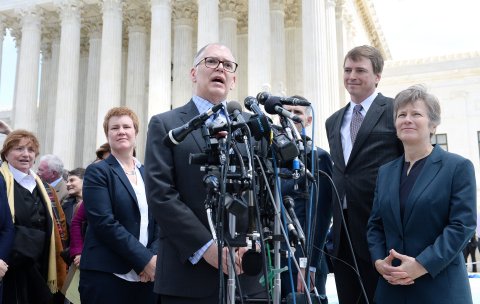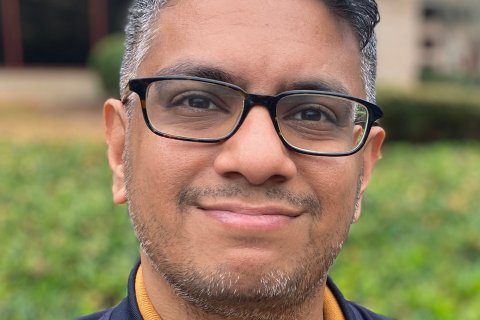-
76ers Expect Joel Embiid to Return From Knee Surgery in Time for Training Camp - 16 mins ago
-
Puppy’s Suspicious Reaction to Sparkling Water Declared Relatable: ‘Valid’ - 23 mins ago
-
Elon Musk impersonators scam victims with fake Tesla and cash giveaways - 31 mins ago
-
Budapest Student to Join Arctic Expedition on Nuclear Icebreaker - 39 mins ago
-
8-year-old girl pulled from sewer after 7 hours as floods batter southern China - 48 mins ago
-
Tinder co-founder buys Walk of Fame property in Hollywood - 55 mins ago
-
104 Super Bowls? Five Million Fans? The 2026 World Cup Will Be Colossal in Big Ways - 59 mins ago
-
Rocket Classic: Collin Morikawa Rips Reporter amid Stunning Caddie News - about 1 hour ago
-
Szabolcsi Apple Pálinka Wins Grand Prize - about 1 hour ago
-
Living in lockdown: Undocumented immigrants trade freedom for safety - 2 hours ago
Ten Years After Landmark Supreme Court Ruling, Is Same-Sex Marriage at Risk?
A decade after same-sex marriage was legalized nationwide via a landmark Supreme Court ruling, many LGBTQ+ individuals fear the right may no longer be secure, with some signs that long-growing Republican acceptance of it could be waning.
Obergefell v. Hodges was decided on June 26, 2015, in a 5 to 4 ruling. Justices John Roberts, Clarence Thomas and Samuel Alito, who still sit on the nation’s top court, wrote dissenting opinions along with their former colleague, the late Justice Antonin Scalia.
While Gallup polling in 2015 showed that just 37 percent of Republicans thought same-sex marriages should be valid, that number rose to a record high of 55 percent in 2022 and 2023, but has since dropped to 41 percent as of May—a double-digit decline. Over the past few months, conservative lawmakers in at least nine states have introduced legislation aimed at undermining same-sex marriage. Some of these bills specifically take aim at the Supreme Court, urging the justices to overturn the Obergefell precedent.
“As an interracial gay couple with an adopted daughter, these developments are deeply unsettling—especially living in a swing state that leans conservative,” Nikhil Patil, who resides in Georgia and married his husband in 2020, told Newsweek. “My husband and I have had difficult conversations about contingency plans.”
Courtney Klok/Courtesy of Jeremy Hanson-McIntyre
Jeremy Hanson-McIntyre, who resides in Michigan and married his husband Joe in 2024, shared similar sentiments with Newsweek, saying that the legality of his marriage feels “very unstable, precarious and unsafe.” He particularly blamed President Donald Trump and the Christian nationalist movement he’s aligned with.
“The current sitting president has built his campaign, image and reputation around the hatred and anger from the viewpoint of the Christian nationalists who utilize their hate-filled Bible thumping as a means to silence freedoms and prevent mere humans from simply living their own lives,” he said.
Newsweek reached out to the White House for comment.
Is Same-Sex Marriage Under Threat?
On June 10, the Southern Baptist Convention—the nation’s largest Protestant denomination—called at its national meet for the “overturning of laws and court rulings, including Obergefell v. Hodges, that defy God’s design for marriage and family.”
Justice Clarence Thomas took aim at Obergefell in a 2022 concurring opinion when the Supreme Court overturned the landmark Roe v. Wade precedent, which had allowed abortion nationwide for nearly 50 years. In his opinion, Thomas said the court should also “correct the error” set by the precedent of Obergefell, as well as Lawrence v. Texas, which established that criminal penalties for sodomy or private sexual acts between consenting adults are unconstitutional.
The opinion raised alarm bells for many LGBTQ+ individuals, especially as Thomas’ opinion came with the Supreme Court’s overturning of a long-established right to abortion. In response, Congress passed the bipartisan Respect for Marriage Act later that year, which shored up protections for same-sex marriage.
While Obergefell could still technically be overturned, and conservative states could then outlaw issuing same-sex marriage licenses, the bipartisan legislation requires states to recognize all marriages performed in other domestic or foreign jurisdictions. In the House, 39 Republicans voted “Yea,” as did 12 GOP senators—meaning a significant majority of the GOP lawmakers voted against the bill in both chambers.

Olivier Douliery/Getty
Jim Obergefell, lead plaintiff in the 2015 case, recently shared his concerns. “Yes, I’m worried about marriage equality,” he told USA Today. “If Obergefell is overturned, we go back to a time or a place where a queer couple in Ohio, where I live, might want to get married, but Ohio could refuse to issue a marriage license because Ohio still has a state level Defense of Marriage Act on the books.” He added: “Our biggest challenge is making sure we don’t lose the progress we have made.”
At the local level, conservative lawmakers in Idaho, Michigan, Missouri, Montana, North Dakota, Oklahoma, South Dakota, Tennessee and Texas have introduced measures aimed at undermining same-sex marriage in recent months. While none of these have been successfully passed through a state legislature, the effort is notable, particularly as many directly urge the Supreme Court to overturn Obergefell.
“It is an important state sovereignty issue and one that should be debated at the state level, not at the U.S. Supreme Court level. The decision has already infringed on citizens’ religious freedoms,” Idaho state Representative Heather Scott, a Republican who introduced a measure urging the Supreme Court to overturn the precedent, told Newsweek.
Daniel Innis, chairman of the LGBT group Log Cabin Republicans and a GOP state senator in New Hampshire, dismissed the effort playing out in some state legislatures. “That’s not how stuff works, particularly the Supreme Court. I find the whole thing quite amusing, honestly,” he told Newsweek.
Innis said “there are people who occasionally play to the sort of fringe,” adding the problem exists on the “left and the right.”
“Over the last decade, the presence of gay and lesbian folks in the Republican Party has become much more visible. It’s totally like coming out of the closet a second time, when you’re gay and come out as a Republican,” he said.
MassResistance, an anti-LGBTQ+ group that promotes socially conservative positions, has been the key driver behind many of the efforts in state legislatures to target same-sex marriage. The organization declined an interview request for this article.
“We are certainly flattered that Newsweek would want to interview us. However, given your personal situation regarding this issue, we can’t believe there’s any way you could be objective or fair. So we’ll pass on this,” the organization said. The rejection appeared to refer to the fact that this writer identifies as queer.
Sarah Kate Ellis, president and CEO of the LGBTQ+ advocacy group GLAAD, said that “threats to marriage equality are coming from a small fringe of extremists.” She said that these individuals “refuse to accept the reality that they have lost this battle for acceptance and our country is better off for it.”
Trump and Same-Sex Marriage
During his 2016 presidential campaign, Trump briefly waved a rainbow flag with the words “LGBTs for Trump” during a Colorado rally. Groups like “Gays for Trump” and Log Cabin Republicans rallied behind him in that campaign, and in June 2016, Trump posted to Twitter, now X: “Thank you to the LGBT community! I will fight for you….”
After taking office, he appointed Richard Grenell, who is openly gay and in a same-sex relationship, as his ambassador to Germany. In 2020 Grenell was named by Trump as acting director of national intelligence, making him the first openly gay person to serve in a Cabinet-level position, although he was never confirmed by the Senate.
Ahead of the 2024 Republican National Convention, Trump quietly, and successfully, pushed the RNC to remove its definition of marriage as “between one man and one woman.” The updated platform instead promises that the GOP will “promote a Culture that values the Sanctity of Marriage, the blessings of childhood, the foundational role of families, and supports working parents.”
In his second term, Trump appointed Scott Bessent, who is in a same-sex marriage, as treasury secretary. Bessent’s appointment made him only the second-ever openly gay individual to be Senate-confirmed to a Cabinet role, the first being former Transportation Secretary Pete Buttigieg under former President Joe Biden. It also made him the highest-ranking LGBTQ+ person in U.S. history, as he is currently 5th in line to the president.

Jose Luis/AP
“Trump has done this quietly,” Innis said, criticizing the previous Democratic administration for focusing on “identity politics.” He said Bessent is a “perfect example.”
“This is a competent professional who knows his business, and he’s not walking around carrying the gay flag,” the Log Cabin chair said.
Despite Trump’s actions, post-2024 election polling by the LGBTQ+ advocacy group Human Rights Campaign (HRC) showed 84 percent of the community backed former Vice President Kamala Harris, while just 14 percent supported Trump. Preelection polling by GLAAD showed that only 15 percent of LGBTQ+ respondents preferred Trump over the Democratic ticket.
Trump and the Transgender Community
Some of the LGBTQ+ opposition to Trump may derive partly from his administration’s stance on transgender issues. Solidarity is important to many LGBTQ+ individuals, and some see strong parallels between the anti-trans movement and the efforts to prevent same-sex couples from marrying prior to Obergefell.
During his 2024 campaign, the president routinely railed against transgender athletes and raised concerns about “gender ideology” in schools. He even floated the claim that gender transition surgeries were being conducted during the school day.
“No transgender, no operations. You know, they take your kid…there are some places, your boy leaves for school, comes back a girl. OK? Without parental consent,” he said last October. The claim lacks evidence, and professional medical organizations recommend that any gender-affirming surgery is performed after an individual turns 18.
On his first day back in office, Trump signed an executive order targeting the transgender community. The order said the U.S. would “recognize two sexes, male and female,” stating that “these sexes are not changeable and are grounded in fundamental and incontrovertible reality.” His administration has gone on to target transgender athletes, and transgender individuals applying for new passports have received documents that list their sex assigned at birth, disregarding how they identify today.
Innis said he doesn’t see the Trump administration’s effort as being “anti-trans.” He said it is “a sentiment of protecting girls in sports and, you know, all sorts of other issues.”
“I think we’ve got to be reasonable and say, you have every right to exist. You have every right to pursue what you perceive to be the best solution for you, but that doesn’t mean you could trample on the rights of others. And I think that’s what the president is trying to get at,” he said.
Last December, Charlie Baker, president of the National Collegiate Athletic Association (NCAA), told a Senate panel that there were fewer than 10 transgender athletes—out of more than 500,000 total athletes—competing in the association. It’s unclear how many there are nationwide in local high schools and middle schools, but most researchers believe the number to be vanishingly small.
The Future of Same-Sex Marriage
While Gallup’s polling has shown a dip in GOP support for same-sex marriage over the past couple of years, Americans overall approve by a large margin. As of May, the polling organization’s data showed 68 percent of Americans believe same-sex marriages should be valid, while less than half that number, 29 percent, said they should not be.
“When people see our families and recognize that we share the same values and challenges as any other family, support for our basic rights rises,” GLAAD’s Ellis said.
Additionally, a growing number of young Americans identify as LGBTQ+. More than one in five, 22 percent, of those aged 18 to 29 say they are part of the community, according to survey results from the Public Religion Research Institute (PRRI). That’s more than double the 10 percent of the 30- to 49-year-olds who identify the same way.
But even as demographics change and gay Republicans become more visible, the conservative pushback to the LGBTQ+ community raises concern for many.

Courtesy of Nikhil Patil
“It’s a strange dichotomy—we have more gay representation in media and pop culture than ever before, yet we’re seeing a surge in anti-LGBTQIA+ sentiment at the political level,” Patil said.
Hanson-McIntyre said that the Trump administration has “made active moves against the LGBTQ+ community” and “has fostered an environment and atmosphere…that emboldens those with prejudices, biases and uneducated fears against the LGBTQ+ community.”
At the same time, Hanson-McIntyre said he’s seen how some within the Republican Party have changed their perspectives. “Those who have become more accepting are out there and do exist. The problem is, it’s the irrational far-right agenda which screams the loudest and the ugliest,” he said.
Source link






























